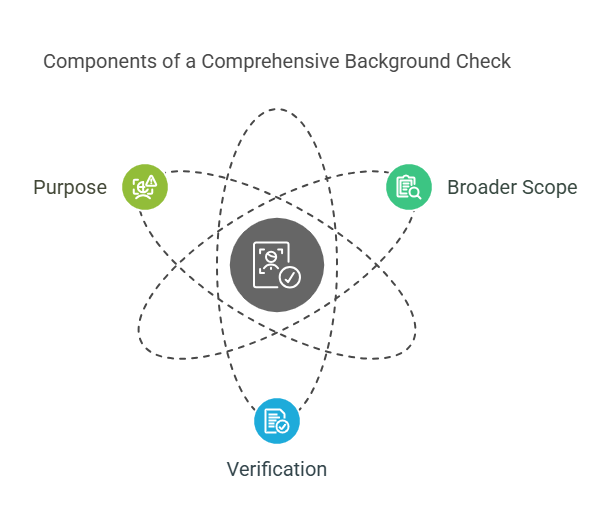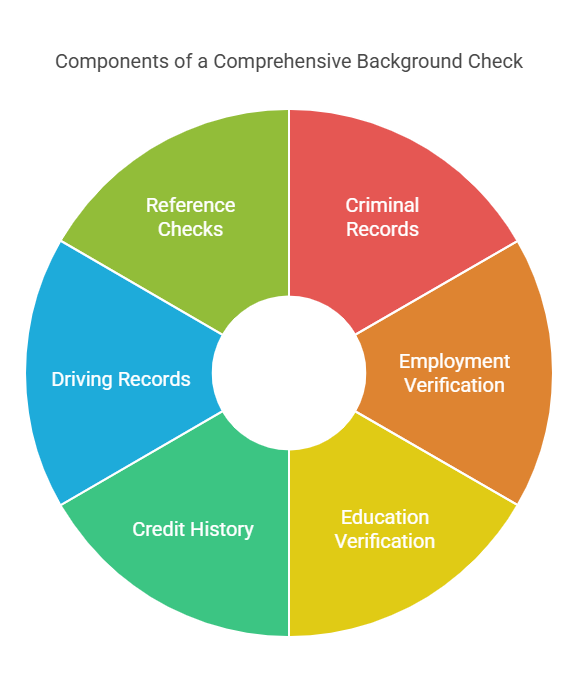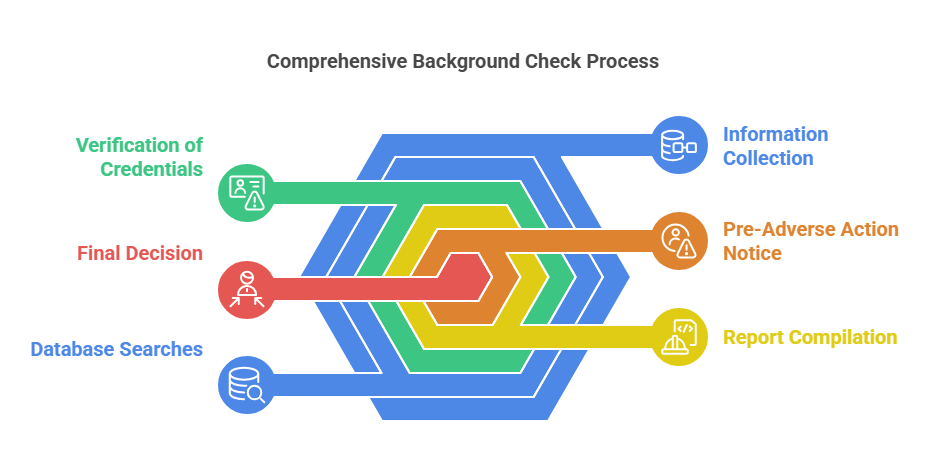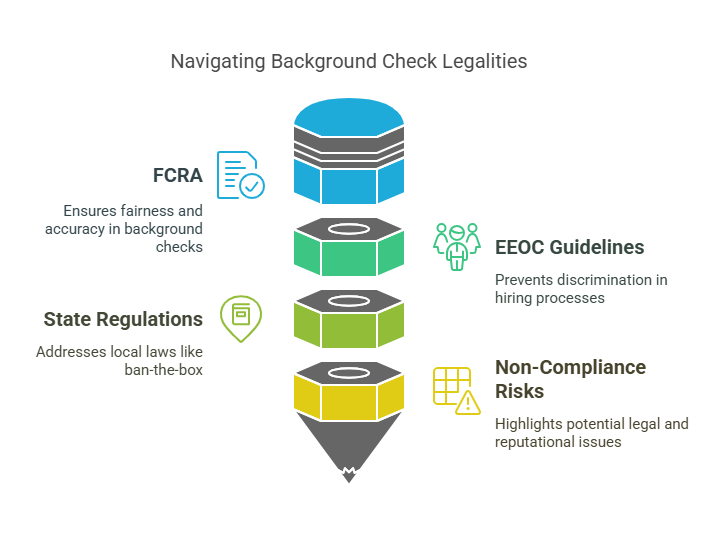Essential Steps for a Comprehensive Background Check

Introduction and Overview of Comprehensive Background Checks
A comprehensive background check is an extensive screening process designed to provide detailed insights into an individual’s personal, professional, and financial history. These checks go beyond basic background checks by evaluating multiple data points to ensure that an individual meets specific requirements for a role, responsibility, or opportunity.
Comprehensive background checks are commonly used in industries like employment, tenancy, healthcare, and education. They help employers, landlords, and organizations mitigate risks, comply with legal standards, and make informed decisions based on a full understanding of the candidate or applicant’s background.
What Makes a Background Check Comprehensive?

A background check is classified as “comprehensive” when it covers a wide range of information and verifies it thoroughly. Below are key elements that differentiate comprehensive checks from basic checks:
- Broader Scope: Comprehensive background checks investigate multiple aspects of an individual’s history, such as employment, education, and criminal records, rather than focusing on one or two areas.
- Verification: Unlike basic checks, these involve verifying details with official records, such as educational institutions and previous employers.
- Purpose: Comprehensive checks aim to minimize risks for employers and ensure that candidates are fully vetted before decisions are made.
Types of Information Included in a Comprehensive Background Check

A comprehensive background check may encompass the following components:
- Criminal Records
- Searches federal, state, and county databases to identify past convictions, pending cases, or arrests.
- Includes checks for violent crimes, theft, fraud, or offenses on the sex offender registry.
- Employment Verification
- Confirms the candidate’s previous job titles, dates of employment, and reasons for leaving.
- Ensures that claims about professional experience are accurate.
- Education Verification
- Validates degrees, certifications, and attended institutions.
- Prevents credential fraud, which is common in industries requiring advanced qualifications.
- Credit History
- Reviews the individual’s financial standing, including outstanding debts, bankruptcies, and credit scores.
- Essential for roles involving financial management or access to sensitive financial information.
- Driving Records (if applicable)
- Provides a history of traffic violations, DUIs, and license suspensions.
- Often required for positions involving vehicle operation, such as delivery drivers or truck operators.
- Reference Checks
- Collects feedback from professional or personal references to gauge character, work ethic, and reliability.
Why Businesses and Organizations Prefer Comprehensive Background Checks
Comprehensive background checks provide organizations with critical insights that basic checks may overlook. Some reasons businesses prioritize these include:
- Risk Mitigation: Identifying potential issues early, such as criminal activity or false credentials, reduces liability and workplace risks.
- Compliance: Comprehensive checks ensure adherence to laws and regulations, such as the Fair Credit Reporting Act (FCRA) and industry-specific standards.
- Improved Decision-Making: Employers and landlords can confidently select candidates or tenants based on a full picture of their background.
- Increased Safety and Security: Comprehensive checks help prevent workplace violence, fraud, and tenant disputes, creating a safer environment for all parties involved.
Scenarios Where Comprehensive Background Checks Are Essential
- Employment
Employers rely on comprehensive checks to verify qualifications, identify any criminal history, and ensure candidates meet job requirements. - Tenant Screening
Landlords use these checks to evaluate potential tenants’ rental history, creditworthiness, and criminal background, reducing the risk of property damage or non-payment. - Volunteer Organizations
Nonprofits, especially those working with vulnerable groups like children or the elderly, use comprehensive checks to ensure the safety of their beneficiaries. - Financial Institutions
Banks and other financial organizations perform detailed checks to ensure employees handling sensitive information or money have a clean record. - Healthcare and Education
Comprehensive checks are crucial for verifying the qualifications and trustworthiness of professionals in these industries, where safety and ethical standards are paramount.
Key Benefits of Comprehensive Background Checks
- Thorough Risk Assessment: Provides a full picture of an individual’s background, reducing the chances of hiring or working with unsuitable candidates.
- Legal Compliance: Adheres to regulatory requirements, such as the FCRA, and helps avoid costly lawsuits.
- Trust Building: Shows a commitment to professionalism and due diligence, fostering trust among stakeholders.
Step-by-Step Process of Conducting a Comprehensive Background Check

Comprehensive background checks involve several stages to ensure accurate and thorough screening. Here’s a breakdown of the process:
- Request for Consent
- Employers or landlords must obtain written consent from the individual being screened.
- This step ensures compliance with the Fair Credit Reporting Act (FCRA) and other applicable laws.
- Information Collection
- Details such as the individual’s full name, date of birth, Social Security number, and address history are gathered to perform the check.
- Database Searches
- Multiple databases are searched for information related to criminal records, employment history, education, and more.
- Searches often include federal, state, and county-level databases for criminal history.
- Verification of Credentials
- Educational degrees and employment claims are cross-referenced with the issuing institutions and previous employers.
- This step ensures accuracy and prevents credential fraud.
- Report Compilation
- The findings from various searches are compiled into a final report.
- This report is then shared with the employer, landlord, or organization for decision-making.
- Pre-Adverse Action Notice (if needed)
- If negative information affects the decision, the employer or landlord must provide a pre-adverse action notice and allow the individual to dispute inaccuracies.
- Final Decision
- Once disputes (if any) are resolved, the employer or landlord makes the final decision and provides the individual with an adverse action notice if necessary.
Applications of Comprehensive Background Checks
Comprehensive background checks are used across various industries and scenarios to ensure safety, compliance, and informed decision-making.
- Employment
- Employers, particularly in industries like healthcare, finance, and transportation, conduct comprehensive checks to verify qualifications, identify criminal records, and assess trustworthiness.
- Tenant Screening
- Landlords rely on comprehensive checks to evaluate a tenant’s rental history, creditworthiness, and criminal background, ensuring reliable tenants for their properties.
- Volunteer Organizations
- Nonprofits and charities conduct these checks to ensure the safety of vulnerable groups, such as children or the elderly, and protect their reputation.
- Financial Services
- Banks and financial institutions use these checks to confirm the integrity and qualifications of employees handling sensitive data or finances.
- Education and Healthcare
- Schools and hospitals require comprehensive checks to ensure staff meet legal, ethical, and professional standards.
- Government and Military
- These sectors often require extensive screening, including security clearance checks, to verify candidates’ eligibility for sensitive positions.
Benefits of Conducting Comprehensive Background Checks
- Minimizing Risks
- Identifying potential issues early helps prevent workplace violence, fraud, or damage to a company’s reputation.
- Ensuring Compliance
- Comprehensive checks adhere to regulations like the FCRA, Equal Employment Opportunity Commission (EEOC) guidelines, and state-specific laws.
- Improving Hiring Accuracy
- Employers can make better decisions by ensuring candidates are fully qualified and have no hidden liabilities.
- Enhancing Trust
- Conducting thorough checks demonstrates a company’s commitment to integrity and safety, building trust among employees and customers.
Precise Hire: A Trusted Partner for Comprehensive Background Checks
When it comes to conducting thorough and compliant background checks, Precise Hire stands out as a trusted provider. Here’s how their services add value:
- Accuracy
- Precise Hire uses advanced technology and access to reliable databases to ensure accurate results.
- Compliance
- Their services are fully compliant with the FCRA and other legal requirements, protecting employers from potential lawsuits.
- Efficiency
- Despite the depth of the check, Precise Hire ensures fast turnaround times, helping businesses make timely decisions.
- Customizable Services
- Clients can choose from various packages tailored to their industry needs, whether it’s a criminal record check, employment verification, or a complete screening.
Comparison: Basic vs. Comprehensive Background Checks
| Feature | Basic Background Check | Comprehensive Background Check |
|---|---|---|
| Scope | Limited to specific areas | Covers multiple aspects of history |
| Criminal Records | Local or state-level only | Includes federal, state, and county-level searches |
| Employment Verification | Not always included | Thorough verification of all listed employers |
| Education Verification | May be omitted | Verifies degrees, certifications, and institutions |
| Credit History | Not included | Included for roles requiring financial responsibility |
| Turnaround Time | Faster but less thorough | Takes longer due to in-depth checks |
Challenges of Comprehensive Background Checks
- Cost
- Comprehensive checks are more expensive than basic checks due to the depth and breadth of information analyzed.
- Solution: Opt for providers like Precise Hire that offer cost-effective packages without compromising quality.
- Time
- These checks can take longer to complete, especially when verification of credentials is involved.
- Solution: Use efficient providers that prioritize timely results while maintaining accuracy.
- Legal Risks
- Conducting these checks improperly can result in violations of FCRA or state-specific laws.
- Solution: Partner with professional providers like Precise Hire to ensure full compliance.
Legal Aspects of Comprehensive Background Checks

Conducting comprehensive background checks comes with several legal obligations that businesses and organizations must follow. Here are the key legal aspects to consider:
Fair Credit Reporting Act (FCRA)
The FCRA regulates how background checks are conducted, ensuring fairness, accuracy, and transparency. Key requirements include:
- Disclosure and Consent
- Employers must inform candidates in writing that a background check will be conducted.
- Candidates must provide written consent before the check can proceed.
- Adverse Action Process
- If adverse action (e.g., not hiring) is based on the background check, employers must:
- Provide a pre-adverse action notice, including a copy of the report and a summary of rights.
- Allow the candidate time to dispute inaccuracies before taking final action.
- If adverse action (e.g., not hiring) is based on the background check, employers must:
- Data Accuracy
- Employers must ensure the information used in decision-making is accurate and up-to-date.
Equal Employment Opportunity Commission (EEOC) Guidelines
The EEOC enforces anti-discrimination laws, ensuring background checks are not used to unfairly exclude candidates based on race, gender, or other protected characteristics. Best practices include:
- Assessing candidates individually rather than relying solely on automated decisions.
- Avoiding blanket policies (e.g., rejecting anyone with a criminal record).
- Ensuring the information considered is job-related and consistent with business necessity.
State-Specific Regulations
Some states have additional rules governing background checks. Examples include:
- Ban-the-Box Laws
- Prohibit asking about criminal history on initial job applications.
- Aim to provide fair opportunities for individuals with criminal records.
- Salary History Bans
- Restrict employers from asking about a candidate’s salary history during the hiring process.
- Time Limitations
- Some states limit how far back certain records (e.g., criminal offenses) can be reported.
Risks of Non-Compliance
Failing to adhere to legal requirements can result in:
- Fines and penalties.
- Lawsuits from candidates.
- Reputational damage to the organization.
Partnering with a compliant background check provider like Precise Hire helps employers navigate these legal complexities effectively.
FAQs about Comprehensive Background Checks
What Information Does a Comprehensive Background Check Include?
A comprehensive background check includes:
-
- Criminal records (federal, state, and county levels)
- Employment verification
- Education verification
- Credit history (if relevant)
- Driving records (for roles involving driving)
How Long Does It Take to Complete a Comprehensive Background Check?
-
- Most comprehensive checks take 3–7 business days, depending on the depth of the investigation and the responsiveness of institutions involved in verification.
Are Comprehensive Background Checks Required for All Job Positions?
-
- No, the necessity depends on the role and industry. Positions in healthcare, finance, education, and transportation often require comprehensive checks to meet legal or industry standards.
How Can I Dispute Incorrect Information Found in a Comprehensive Background Check?
-
- You can dispute inaccuracies by:
- Contacting the background check provider.
- Providing documentation to support your claim.
- Following up to ensure corrections are made promptly.
- You can dispute inaccuracies by:
What is the Cost Difference Between Basic and Comprehensive Background Checks?
-
- A basic check may cost $20–$50, while a comprehensive check can range from $50–$200, depending on the depth of screening and provider.
Conclusion
Comprehensive background checks are a critical tool for making informed decisions in hiring, tenant screening, and other professional contexts. They go beyond basic checks by providing detailed insights into an individual’s history, including criminal records, employment and education verifications, and more.
By adhering to legal requirements, such as those outlined in the FCRA and EEOC guidelines, organizations can protect themselves from legal risks while promoting fairness and transparency in their processes.
Moreover, working with trusted providers like Precise Hire ensures accurate, efficient, and compliant background checks tailored to your industry’s needs. Their expertise helps organizations mitigate risks, improve hiring accuracy, and build trust with stakeholders.
For businesses, landlords, or organizations seeking peace of mind, comprehensive background checks remain a cornerstone of responsible and informed decision-making.
